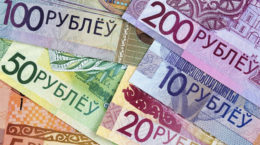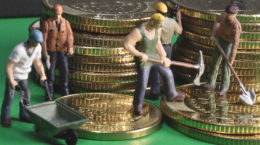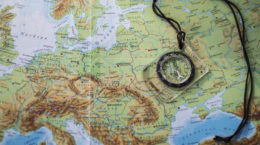Let’s speak honestly. Without hopes for 100500 billion EUR that the West will supposedly give us as soon as we get rid of Lukashenka to start a great life. Without hopes that somebody will give us the Khanty-Mansi AD when Russia collapses. Yet judging by the real state of our country and the whole region we live in.
During all the years (decades) of the rule of Lukashenka, the economic model of Belarus has not changed a bit. We took raw and energy source materials from Russia, processed them and sold the products both to the Western market, to the Russian Federation itself (as its market was open for us), and to the former USSR countries. At the same time, the Belarusian industry used Western technology and Western equipment, and often even the Western financing for its production.
Nevertheless, don’t you agree, that it is not a model of growth and development, but of parasitizing on someone else’s resources and political “special relationship” with just one country? All that leads to a dead end. It’s even more obvious that it is a dead end now, as Russia’s defeat in the war lays before it, as is, probably, its disintegration into separate states (at best) or a bloody civil war (at worst). One way or another, Belarus ends up with nothing but the economy which has not been reformed since 1994.
By the way, that nothing is also a result of the horrible underdevelopment of the domestic market, since in all those decades, the state has been stimulating export-oriented work and not encouraging competition between domestic producers in the market inside the country. Like, why do we need competition, if we have “forecast indicators” and manufacturing assignments (a state plan)? Result was not good at all: I remember how I could not find in Minsk… wooden shovel handles made in Belarus. There were lots of Russian ones, but not eve one produced in Belarus.
Anyway, huge business projects with foreign participation and foreign investments also did not operate in a competitive environment in Belarus just because everything had to be approved and allowed to enter the market only by the one and only person at the very top of the power pyramid. Good examples are the Swiss company Stadler, or the Austrian Kapsch: those projects were implemented without any tenders or competition.
However, there is no sense to discuss all that now. The relationship with the West has been ruined, and we are not going to get any new technologies or money from there unless we do not change those in power. The only relationship we have is the one with Russia, which is, to put it mildly, not the partner to make a bet on.
Therefore, we have to think how to survive on our own and live with the help of our own mind and our own work in the situation when the energy prices will grow to reach the world level, and the Russian market that seemed so limitless, will collapse in a blink of an eye. At that moment, the whole Belarus is going to realize that it is not particularly interesting to the western businesses. Our market is small, and our people are poor: even the marketing costs of entering our country are not always justified. Economic relations inside Belarus are “twisted”: for example, a lot of functions performed by small and midsize business in the developed countries, are performed by state structures in Belarus. Before, Belarus could be attractive for the companies wishing to enter the Russian market, yet after 24 February 2022 it’s not reasonable anymore.
Until now, the leadership of Belarus was trying to develop all spheres of the economy at the same time, all spheres of industry, under the brand name of “preserving all the best that the USSR had”. It turned out as always, meaning it turned out bad. It scattered the priceless resources and opportunities deficient for Belarus. It means now we need to determine which specific spheres of economy we should develop, which growth points we can find taking into account advantages and disadvantages that Belarus has, and focus on them. To put it into simpler words, the question is: how do we find our own competitive niche? (Or maybe several competitive niches – the country is not that small).
Since Belarus refused to develop the IT industry by forcing IT specialist out of the country with repressions, only one thing remains for us: industrial manufacturing. For that, we have (for now) both the potential and the needed infrastructure. If we develop that wisely, Belarus might turn out to be an interesting production site, manufacturing goods both for the developed countries and for the market of the third world. Let’s say, materials, components and accessories for those developed ones, and cheap ready-made goods for the developing.
All that is possible thanks to the possibility to unite the western industrial technologies with not expensive, but qualified Belarusian workforce. It is that combination that is going to give the due correlation between price and quality. The workforce in Belarus is already cheaper than in China (how have we stooped so low?), but we have a huge advantage for the European market: a short logistics shoulder (there’ll be no need to transport goods on long distances, as we are part of Europe).
It should be mentioned that such countries as Slovakia, Bulgaria or Romania have been developing according to such model in the recent decades. Yet, as they had entered the EU, the salaries there grew sharply, and they keep growing. It is a good thing for the population, but not so good for the industry. So, now, after Lukashenka leaves, it is exactly Belarus that can become that sort of an “industrial base” to produce goods at little costs.
The most obvious goods for today are automotive components, wood processing products and simple mechanical engineering, and also food industry, primary processing of raw materials, textile, production of construction materials and fertilizers. Of course, all that will become possible only after serious and very unpleasant reforms, during which social load will be taken off from the enterprises, are carried out. Only when our enterprises stop transferring social costs on the production costs, they can become potentially competitive.
Sometimes one might hear such an argument: Belarus does not have enough (or any) its own raw materials to develop the industrial sphere. Frankly speaking, that’s not a valid argument. Germany and Switzerland also have very little raw material in their territories, however, the industries in those countries are highly developed. They prioritize other factors: the system which encourages innovation and highly qualified personnel. Once you have all those, the raw materials stop being a problem. New Belarus, having good relations with all its neighbours, can receive raw materials from any place in the world.
Let’s sum it all up. After the end of the war in Ukraine and after the change of power in Belarus, our country will be able to integrate into the global economy quite quickly. Of course, it’s unlikely we’ll have a rapid rise to the level of Germany or Finland, but we should be able to compete with such countries as Poland or Slovakia in several years.
Of course, there is a huge temptation to pay more attention to the service industry, and not to the manufacture during our economic development. It’s not surprising: services provide for 60-90% of the GDP in the developed countries. Nevertheless, I’m afraid, we’ll have to focus on manufacturing first, and put on hold the fashionable discussion about the postindustrial knowledge economy. Belarus has already had a chance to become a huge Eastern European IT hub, but, regrettably, it buried that chance in 2020. Now, Belarusians will literally have to forge their future at the machine tool.
Although, of course, the service industry is going to generate a significant share of the country’s income. Geographical location of Belarus at the crossroads between the North and the South, between the West and the East, also between the West and the East in a wider notion, inevitably paves the way for the companies of our country to earn by providing logistics and transportation services.
The economy of our planet is not moving towards globalization any longer. The turmoil of recent years made the pendulum swing in the opposite direction. The today’s world is moving from globalization to rationalization, first of all, in the industrial sphere. For example, when during the pandemic of the 2020 China “closed” for quarantine, all the producers of trucks in Germany also stopped. As it turned out, radiators for German trucks of all brands were produced at Chinese plants.
German automakers have learned from that experience, and now they are looking for closer and more predictable component manufacturers. If Belarus were open to the world and had a free economy, it would have an opportunity to place such production on its territory. This is only one of the many examples how we can find our own niche, both in manufacturing and in service industry.
To be continued…
Our House








